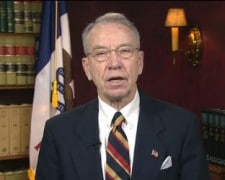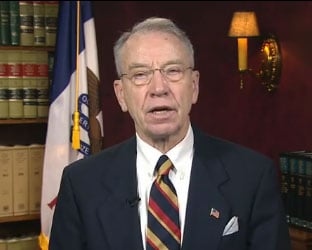 Sen. Chuck Grassley (R-IA) isn’t done with the FCC yet in regards to the LightSquared proceeding, but he has indicated that he’s now getting enough cooperation that he feels he can release his hold on a pair of nominees for two open commissioner positions.
Sen. Chuck Grassley (R-IA) isn’t done with the FCC yet in regards to the LightSquared proceeding, but he has indicated that he’s now getting enough cooperation that he feels he can release his hold on a pair of nominees for two open commissioner positions.
The nominees are Jessica Rosenworcel, set to fill the Democratic vacancy, and Ajit Pai, set to fill the Republican vacancy. Grassley and his staff are now getting a steady flow of FCC material to review, and he said, “The documents I’ve seen so far raise more questions than I had before.
However, since there is now a process in place to obtain all of the relevant documents from the FCC, I intend to lift my hold on the two FCC nominees.”
Grassley did not say exactly when the hold would be lifted. The Senate is about to take a week off but will go back in session Monday 5/7/12.
Here is Grassley’s full statement:
“Exactly one year ago today, I wrote my first letter to the FCC on LightSquared. At that time, headlines were describing interference concerns between LightSquared and Global Positioning System devices. LightSquared’s primary backer was in the news over having attracted the Securities and Exchange Commission’s attention. I wondered why the FCC had given expedited preliminary approval to a project led by someone under SEC investigation and with seemingly serious interference concerns. I began seeking the FCC’s insight into its decision-making on this project. The agency turned out to be among the least responsive I’ve ever come across in 30 years of conducting constitutional oversight of the executive branch of government. The commission suggested my staff go through the Freedom of Information Act and said it would take two years to get a response. The commissioner told me the commission responds only to the chairmen of the two House and Senate committees of jurisdiction. In effect, that leaves 99.6 percent of Congress out of luck if we have questions about the agency’s decision-making.
“As I began my investigation, facts came to light that raised more questions about the FCC’s actions. E-mails showed that LightSquared’s CEO sought meetings with the White House while mentioning attendance at fundraisers for President Obama. Then, news reports showed the White House pressured a four-star general to downplay the threat LightSquared posed to GPS.
“I continued to seek the information on the general principle that the public’s business ought to be public. The FCC continued to stonewall, so I placed a hold on two FCC commissioner nominees in an effort to get the information I requested. Still, the agency stonewalled.
“House Energy and Commerce Committee Republicans made a comprehensive document request of the FCC on LightSquared and are giving me access to the documents as the agency provides them. I appreciate the access.
“At first, the documents were evasively superficial. The submissions contained thousands of pages of already public information, including news clips. The FCC played games to inflate its page count, which is not the mark of a responsive agency. Gradually, the document submissions began to include some substantive information.
“So far, the documents I have seen begin to give some answers about why the FCC gave such fast preliminary approval to LightSquared. The documents show that rather than being an objective arbiter, the commission appeared to be enthusiastic about the LightSquared project and wanted to see it materialize. The prospect of a new broadband provider that could challenge current providers was appealing to the FCC, according to the documents. It’s impossible to draw a complete picture of the FCC’s considerations in green-lighting LightSquared because the documents available so far do not offer a comprehensive view. However, it appears the FCC wanted LightSquared to succeed.
“It may be that the FCC was so intrigued by the prospect of a new broadband provider that it overlooked technical concerns or the financial implications if the project’s chief investor were to undergo SEC sanctions. I can’t say for sure because I don’t have enough information to make a determination.
“However, the documents raise an important question. Is the FCC a neutral arbiter weighing all public interests in each case, or is it a cheerleader for favored projects? If it is a cheerleader, which is inappropriate, why was such an obviously flawed project selected?
“The documents I’ve seen so far raise more questions than I had before. However, since there is now a process in place to obtain all of the relevant documents from the FCC, I intend to lift my hold on the two FCC nominees. But my inquiry is not over. I’m told there are 11,000 more pages of documents from the FCC on LightSquared that will be forthcoming to the House Energy and Commerce Committee. I look forward to receiving access to those documents.
“The public deserves definitive answers on why the FCC handled LightSquared the way it did. Ultimately, the agency decided the GPS interference concerns were too great and withdrew LightSquared’s waiver. LightSquared’s primary investor continues to receive intense scrutiny from the SEC. Now, LightSquared might sue the government. Investment is lost, and future investors might be reluctant to approach the FCC with projects.
“The FCC badly mishandled LightSquared. Finding out exactly what went wrong is key toward preventing future debacles. I hope the pending nominees, and the rest of the commission, will use the LightSquared situation as a case study in what not to do.
“The FCC controls a valuable public resource in the spectrum. Its decisions affect consumers, companies, and jobs. It should be fair, neutral, and above all, transparent. Transparency brings accountability, which the FCC desperately needs.”





